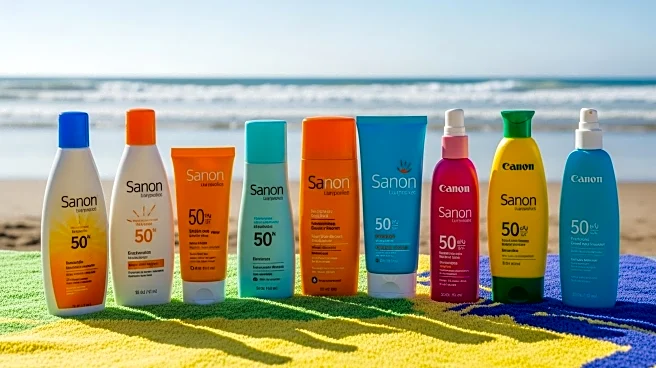What's Happening?
A recent toxicology assessment published in Critical Reviews in Toxicology has confirmed the safety of avobenzone, a common sunscreen ingredient, for use in personal care products. The study, led by Dr. Kimberly Norman, evaluated avobenzone's human health risk profile through clinical and nonclinical data, focusing on pharmacokinetics, toxicology, and real-world exposure data. The findings indicate that avobenzone has a suitable safety profile with low dermal absorption and no significant toxicity markers. The Personal Care Products Council (PCPC), which sponsored the research, emphasized the importance of these findings for North American manufacturers and suppliers, as the FDA continues its review of sunscreen ingredients.
Why It's Important?
The confirmation of avobenzone's safety is significant for the U.S. sunscreen industry, as it supports continued innovation within regulatory parameters. Avobenzone is the only FDA-listed dedicated UVA absorber in the Sunscreen Monograph, making it crucial for broad-spectrum sun care products. The study's findings provide clarity and reassurance to consumers and manufacturers amid increasing scrutiny of product safety. This research may also influence the FDA's ongoing review of sunscreen active ingredients, potentially guiding future regulatory updates and balancing innovation with consumer protection.
What's Next?
The study's methodology, which includes both traditional and non-animal testing data, may serve as a framework for evaluating other UV filters under regulatory scrutiny. The findings could inform the FDA's decisions regarding sunscreen ingredient safety profiles, potentially leading to regulatory updates. The industry may adopt similar approaches for proactive ingredient reviews, ensuring consumer safety while fostering innovation.
Beyond the Headlines
The study highlights the industry's commitment to transparent and science-based evaluations of cosmetic ingredients. By incorporating non-animal testing methods, the research sets a precedent for ethical and comprehensive safety assessments, which could influence future regulatory practices and consumer trust in product safety.









